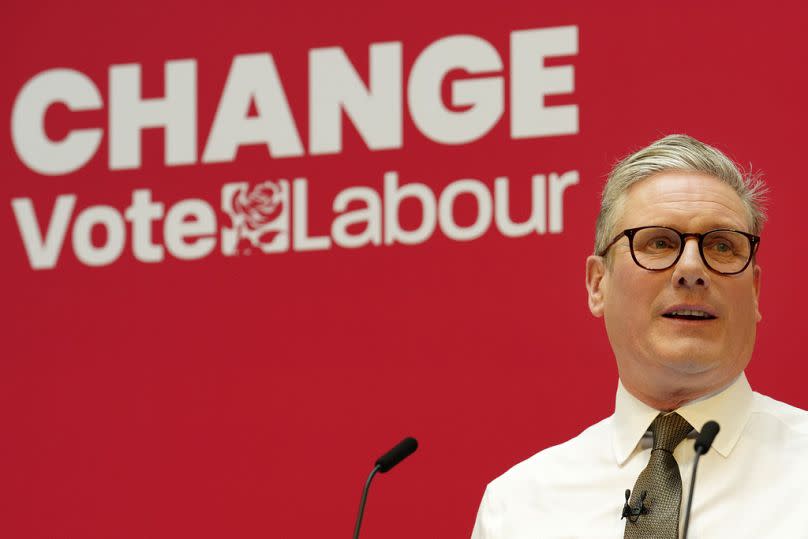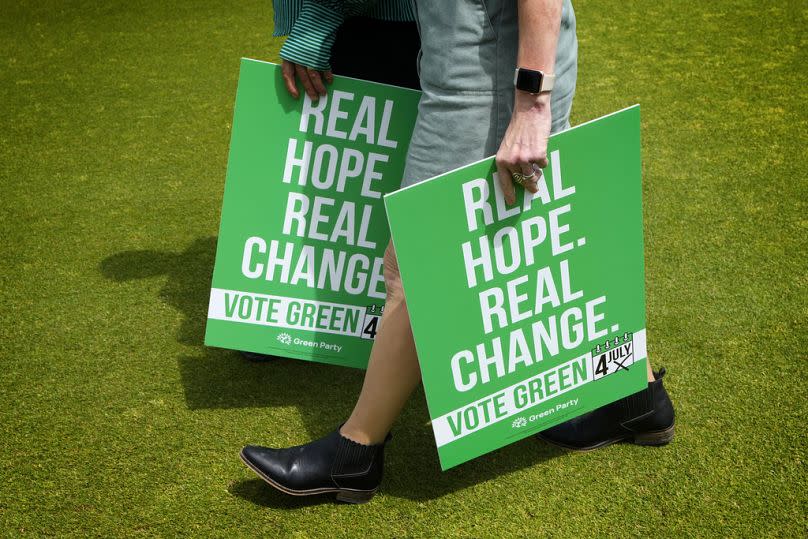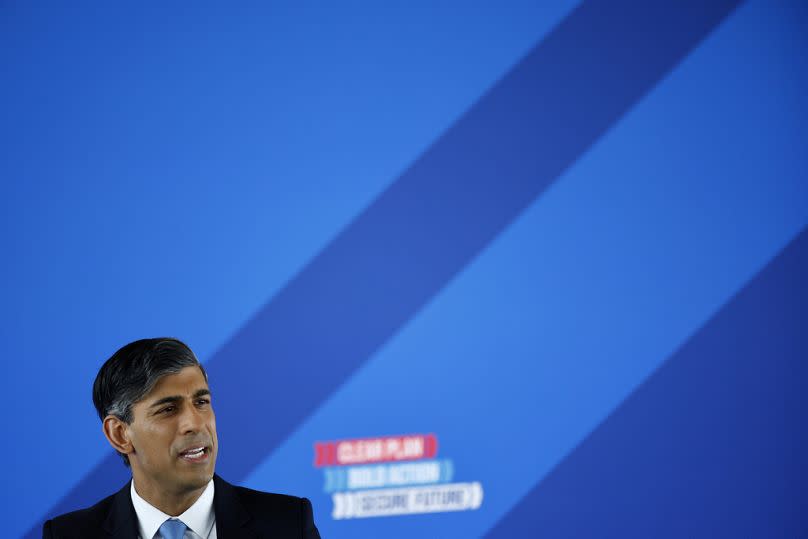The UK election and climate change: Where do political parties stand on 6 key issues?

After one of its warmest and wettest winters on record, a general election has been called in the UK for 4 July.
Climate has been on the back burner when it comes to campaigning so far. There has been a greater focus on the cost of living, healthcare and security from most politicians. Pledges, policies and plans to tackle the climate crisis haven’t been easy to find.
Though the consensus is generally that emissions need to be cut, renewables need to grow and pollution must be reduced, approaches from each of the different parties vary.
We’ve taken a look at six of the most pressing climate issues the UK is currently facing and how some of the biggest political parties plan to respond to them.
6. Reaching the UK’s emissions targets on time
The UK’s independent climate change watchdog, the Climate Change Committee, has warned that the country is not on track to meet its goal of cutting greenhouse gas emissions by 68 per cent before the end of the decade. So what does each party plan to do about it?
Labour: Labour plans to keep the UK’s current target of reaching net zero by 2050. The party wants to “restore the strong global leadership” needed to tackle the climate crisis, aiming to create a new “Clean Power Alliance” which it hopes would bring together a coalition of countries at the cutting edge of climate action.
Conservatives: The party’s full manifesto says it will keep the UK’s 2050 net-zero target but emphasises Prime Minister Rishi Sunak’s desire to do this without additional costs for households. It calls this an “affordable and pragmatic” transition without any new green levies or charges.
Liberal Democrats: The Lib Dems say they will “take the action needed now” to reach net zero by 2045. That includes meeting the UK’s commitment under the Paris Agreement to reduce emissions by at least 68 per cent by 2030.
Green Party: The Green Party has said it wants to reach net zero by 2040 at the latest, ideally more than a decade ahead of the current 2050 target. The party aims to reach this goal “as fast as is feasibly possible” while leading global efforts to transition away from fossil fuels. It has pledged to spend £40 billion (€47.5 billion) a year for this transition to a green economy.
Talks on climate finance stall at Bonn conference: What does this mean for COP29?
The cost of ‘conflict carbon’: Russia could face €30bn climate reparations bill for war in Ukraine
5. Transitioning away from fossil fuels
Countries pledged to move away from fossil fuels at COP28 in Dubai last year. It’s time for action, but the UK is still largely dependent on oil and gas. In 2022- the latest year with the most complete data - fossil fuels accounted for 78.4 per cent of primary energy consumed in the country.
Labour: Labour is backing a windfall tax on oil and gas companies - increasing it by three percentage points - until at least 2029.
Though the party will honour existing oil and gas licenses in the North Sea, it won’t approve any new projects. No new coal licenses will be granted either and it says it will ban fracking for good.
Conservatives: Like Labour, the Conservatives are also backing a windfall tax on oil and gas companies until at least 2029. But the party’s manifesto says rejecting new oil and gas licenses in the North Sea would put “200,000 jobs and billions of pounds of tax receipts at risk”, leaving the UK more dependent on foreign powers for imported gas.
Liberal Democrats: The Lib Dems have promised to help people with the cost of living and energy bills by implementing a “proper” one-off windfall tax on the profits of oil and gas companies. The party’s manifesto says it will maintain the ban on fracking, introduce a new ban on coal mines and bring an end to fossil fuel subsidies.
Green Party: The Green Party says it will cancel recent fossil fuel licenses including the one for the controversial Rosebank project - the biggest undeveloped oil and gas field in the North Sea. It will also end all new fossil fuel extraction projects in the UK and remove all oil and gas subsidies.
The party also wants to introduce a carbon tax on fossil fuel imports and domestic extraction that is based on the greenhouse gas emissions produced when the fuel is burned.

4. Ambitious renewable energy policies
To reach these net-zero targets and transition away from fossil fuels, most parties agree that renewable energy needs a major boost. But they’re divided over onshore wind projects, nuclear power and the future of oil and gas.
Labour: The Labour Party wants to make Britain a “clean energy superpower” pledging £8 billion(€9.5 billion) over five years to a new publicly owned Great British Energy Company. It claims it wants to “cut bills, create jobs and deliver security with cheaper, zero-carbon electricity by 2030”.
It wants to double onshore wind, triple solar power and quadruple offshore wind by 2030. The party’s manifesto also includes pledges to invest in hydrogen and wave energy. Nuclear power will be part of the mix too with plans to extend the life of existing plants and speed up the construction of existing projects.
Despite promises not to approve new oil and gas projects, Labour leader Kier Starmer has emphasised that oil and gas will be part of the UK’s energy mix for “decades to come”.
Conservatives: The Conservative party has said it will accelerate the rollout of renewables. This includes promises to treble offshore wind. Solar will also be boosted with 70 additional gigawatts by 2035. Historically under the Tories, there has been little ambition for onshore wind with just one project currently under construction in England.
The party has also pledged to fast-track the approval of small modular nuclear power stations.
But the manifesto stresses that energy security is the priority and that means more licensing for oil and gas production in the North Sea as well as new gas power stations.
Liberal Democrats: The Lib Dems say they will speed up the deployment of solar and wind with the aim of ensuring 90 per cent of the country’s electricity comes from renewables by 2030.
The party has promised to remove restrictions on new solar and wind power put in place by the Conservatives. In particular, it wants to support investment and innovation in tidal and wave power.
Green Party: The Greens are planning a massive rollout of renewable energy. That includes a push for 80 gigawatts of offshore wind, 53 gigawatts of onshore wind, and 100 gigawatts of solar by 2035.
They back the expansion of offshore wind like most parties but, unlike others, they want to see more growth in onshore wind and solar power projects which have been controversial. In total the party hopes that 70 per cent of UK electricity will come from wind by 2030.
The party also wants to phase out nuclear power entirely which it says is “unsafe and much more expensive than renewables”. It says the development of nuclear power stations is “too slow given the pace of action we need on climate”.
Super election year: What are candidates in the UK, US and Australia planning on the climate?
The city that is trying to sleep: Paris seeks to cut noise pollution by four decibels
3. Cutting emissions from home heating
Ensuring homes are more energy efficient is one of the biggest climate challenges the UK faces. The country has the worst insulted homes in Europe.
Labour: Labour’s manifesto promises to double money for insulting UK homes, offering grants and low-interest loans for improvements like insulation, low-carbon heating and solar panels. It says it will also ensure that all privately rented homes meet energy efficiency standards by 2030.
Conservatives: The Conservatives have made a pledge to introduce a new energy efficiency voucher scheme that would be open to every household in England. This would provide funding for improved insulation and other additions like solar panels. It doesn’t give much more detail like a launch date or budget for said scheme.
Liberal Democrats: A 10-year emergency upgrade programme would see the Lib Dems bring in free insulation and heat pumps for those on low incomes. The party has also promised incentives for others to install heat pumps that cover the “real costs”.
They also want to ensure that all new homes are zero-carbon, including by fitting them with solar panels.
Green Party: The Greens say they will push for a plan led by local authorities to insulate existing homes, provide clean heat and adapt buildings to more extreme climate conditions.
This includes £29 billion (€34.4 billion) over the next five years for home insulation, £4 billion (€4.7 billion) over the next five years to insulate other buildings to a high standard and £9 billion (€10.7 billion) over the next five years for low-carbon heating systems such as heat pumps for homes and other buildings.

2. Cleaning up the UK’s waterways
The UK’s lakes, beaches and rivers are facing a sewage spill crisis that has outraged the public. In the last year, the number of sewage discharges has skyrocketed by 54 per cent and many parties have made pledges to clean up waterways in their manifestos.
Labour: Labour has said it will put failing water companies under special measures. It promises regulators will be given new powers to block bonuses for “executives who pollute our waterways”.
The party’s manifesto also pledges to bring criminal charges against water firms that persistently break the law. It says it will impose automatic and severe fines for wrongdoing while ensuring independent monitoring of sewage spills.
Conservatives: The Conservative Party has said it will continue working with regulator Ofwat to hold water companies accountable - including banning bonuses for bosses if there is a serious criminal breach. It has also pledged to use fines from water companies to invest in river restoration projects.
Despite an increasing problem with spills, however, the party’s manifesto claims that 90 per cent of bathing waters were classified as ‘good’ or ‘excellent last year, up from 76 per cent in 2010.
Liberal Democrats: The Lib Dems have revealed plans to replace the current industry watchdog Ofwat with a “tough new regulator” called the Clean Water Authority. It would be given the power to ban bonuses for water company bosses, force companies to publish data on sewage spills, remove the licences of firms that are performing badly, make water companies put local environmental experts on their boards and set legally binding targets for sewage spills.
“Through a tough new regulator, we will make sure water companies put the environment and their customers first instead of lining the pockets of their shareholders,” Lib Dem leader Ed Davey said.
Green Party: The Greens want to end the sewage crisis by bringing water companies back into public ownership. Many campaigners and environmentalists blame the current situation on escalating issues that started with their privatisation in the 1980s under Margaret Thatcher.
The party’s efforts to ensure the protection of nature also include a pledge to introduce a new Rights of Nature Act that would give rights to nature itself.
May breaks global temperature record for 12th month in a row. Will La Nina bring cooler weather?
'Sounding the alarm': World likely to temporarily pass 1.5C limit by 2028, UN weather agency warns
1. Reducing emissions from transport
Transport emissions are tough to tackle and the UK is no exception. A ban on petrol and diesel cars was pushed back by the Conservative government last year and each party has its own thoughts on the best way to decarbonise transport.
Labour: Labour is planning to reinstate the 2030 ban on the sale of new petrol and diesel cars. It says in its manifesto that this would provide “certainty for manufacturers”. The party also wants to accelerate the move to electric vehicles by investing in the rollout of charging points and support buyers of second hand cars by standardising information about the condition of batteries.
It has also pledged to end “30 years of privatisation” bringing railways back into public ownership.
Conservatives: Rishi Sunak announced last September that he would be pushing back a ban on the sale of new petrol and diesel cars to 2035. What this announcement didn’t include was an obligation for manufacturers to ensure that 80 per cent of car sales are electric by 2030 which will continue despite the ban being pushed back.
Liberal Democrats: The Lib Dems also plan to restore the ban on new petrol and diesel vehicles by 2030. This is complemented by ways of making it “easier and cheaper” for drivers to switch, including the rapid roll-out of charging points and the introduction of grants.
The party’s manifesto also promises investment in active travel and public transport like boosting bus services and freezing rail fares, the electrification of Britain's railways and plans to reduce the climate impact of flying.

Green Party: The Greens want to stop new petrol and diesel car sales as early as 2027 and end the use of petrol and diesel vehicles on UK roads by 2035. They plan to do this with an extensive vehicle scrappage scheme and major funding for the rollout of electric vehicle charging points.
The Green Party’s plan also includes boosting investment in public transport, £2.5 billion (€3 billion) a year for new cycleways and footpaths, and subsidies that would include free bus travel for under 18s. And it wants to bring Britain's railways back into public ownership.
The party manifesto also includes promises to introduce a frequent flyer levy, ban domestic flights that take less than three hours, add VAT to jet fuel, and stop all airport expansion. An economy-wide tax on carbon-producing activities would also impact airlines.

 Yahoo News
Yahoo News 
